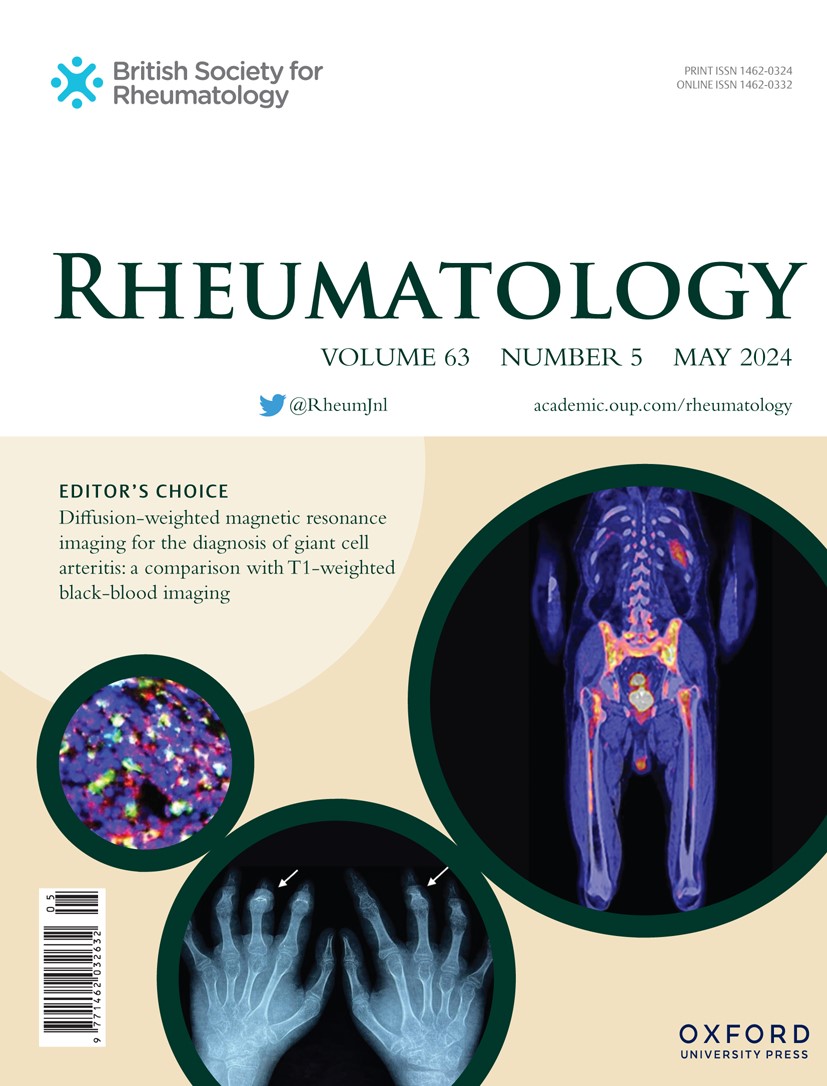Impact of non-serious infections on medication interruptions, quality of life, and disease flares in patients with rheumatoid arthritis.
IF 4.4
2区 医学
Q1 RHEUMATOLOGY
引用次数: 0
Abstract
OBJECTIVES Patients with rheumatoid arthritis (RA) are at an increased risk for serious infections, but less is known about more common, non-serious infections. We aimed to assess the frequency and characteristics of non-serious infections and their effect on medication interruptions, quality of life, and disease flares. METHODS We remotely recruited adults with RA from July 2022 to July 2023 through a community rheumatology practice-based research network. Participants joined the ArthritisPower Registry (now PatientSpot) and completed a baseline survey and up to 6 monthly follow-up surveys, focused on patient-reported outcomes (PROs), infections, medication interruptions, and disease flares. The impact of infections was evaluated by comparing survey measures in those with vs without an infection. RESULTS We recruited 351 patients with RA who contributed 1674 monthly observations. Patients reported 523 infections (31% of observations), most frequently upper respiratory infections. Although few infections led to emergency department visits or hospitalizations, infections frequently led to missed work (37%) or RA treatment interruptions (26%). RA treatment interruptions were more common in those with vs without healthcare encounters or antibiotic use (38% vs 12%) and in more severe vs less severe infections (47% vs 20%). Infections were associated with worse scores for PROMIS Fatigue but not PROMIS Function, Depression, or Ability to Participate Socially. Frequency of disease flares was greater in those with an infection who interrupted RA treatment, especially in patients receiving tumor necrosis factor inhibitors. CONCLUSION Infections are common in patients with RA and frequently lead to medication interruptions. These infections are associated with greater fatigue and impaired work productivity and may contribute to more disease flares.非严重感染对类风湿关节炎患者药物中断、生活质量和疾病发作的影响
目的类风湿关节炎(RA)患者发生严重感染的风险增加,但对更常见的非严重感染知之甚少。我们的目的是评估非严重感染的频率和特征及其对药物中断、生活质量和疾病发作的影响。方法:我们通过社区风湿病实践研究网络,从2022年7月至2023年7月远程招募成人RA患者。参与者加入了arthritis tispower Registry(现为PatientSpot),并完成了基线调查和长达6个月的随访调查,重点关注患者报告的结果(PROs)、感染、药物中断和疾病发作。感染的影响是通过比较有感染和没有感染的调查措施来评估的。结果:我们招募了351例RA患者,每月进行1674次观察。患者报告523例感染(占观察人数的31%),最常见的是上呼吸道感染。虽然很少有感染导致急诊或住院,但感染经常导致缺勤(37%)或类风湿性关节炎治疗中断(26%)。类风湿关节炎的治疗中断在有医疗服务或没有使用抗生素的人群中更常见(38%对12%),在更严重的感染和较轻的感染中更常见(47%对20%)。感染与PROMIS疲劳评分较差有关,但与PROMIS功能、抑郁或社会参与能力无关。因感染而中断类风湿性关节炎治疗的患者,尤其是接受肿瘤坏死因子抑制剂治疗的患者,疾病发作的频率更高。结论感染在RA患者中很常见,并经常导致药物中断。这些感染与更严重的疲劳和工作效率受损有关,并可能导致更多的疾病发作。
本文章由计算机程序翻译,如有差异,请以英文原文为准。
求助全文
约1分钟内获得全文
求助全文
来源期刊

Rheumatology
医学-风湿病学
CiteScore
9.40
自引率
7.30%
发文量
1091
审稿时长
2 months
期刊介绍:
Rheumatology strives to support research and discovery by publishing the highest quality original scientific papers with a focus on basic, clinical and translational research. The journal’s subject areas cover a wide range of paediatric and adult rheumatological conditions from an international perspective. It is an official journal of the British Society for Rheumatology, published by Oxford University Press.
Rheumatology publishes original articles, reviews, editorials, guidelines, concise reports, meta-analyses, original case reports, clinical vignettes, letters and matters arising from published material. The journal takes pride in serving the global rheumatology community, with a focus on high societal impact in the form of podcasts, videos and extended social media presence, and utilizing metrics such as Altmetric. Keep up to date by following the journal on Twitter @RheumJnl.
 求助内容:
求助内容: 应助结果提醒方式:
应助结果提醒方式:


